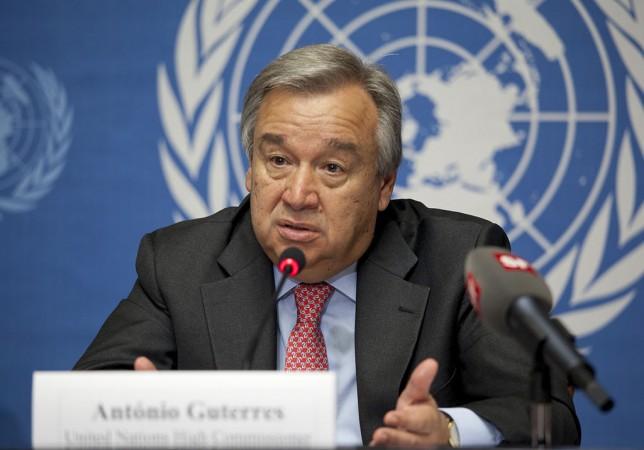
Antonio Guterres, the former Portuguese prime minister, is set to replace Ban Ki-Moon to become the next United Nations Secretary-General after none of the five UN Security Council permanent members vetoed his candidature in the sixth secret ballot on Wednesday.
The selection of the United Nations Security-General required the 15 members of the security council to cast secret ballots for each of the 10 candidates with the choice of encourage, discourage or no opinion. Guterres received 13 encouraging votes and no opinion votes.
"Today after our sixth straw poll we have a clear favourite and his name is Antonio Guterres… We have decided to go to a formal vote tomorrow morning at 10 o'clock, and we hope it can be done by acclamation," Vitaly Churkin, Russian UN Ambassador and council president for October, was quoted saying to reporters with his 14 council colleagues standing behind him, according to Reuters.
However, the Security Council still needs to adopt a resolution behind closed doors for Guterres to be officially recommended to the 193-member General Assembly for election. The resolution needs at least nine votes in favour and no vetoes to pass.
Who is António Manuel de Oliveira Guterres?
Guterres was born in Lisbon in 1949 and graduated from the Instituto Superior Técnico with a degree in engineering. He is fluent in Portuguese, English, French and Spanish. Before joining UNHCR, Guterres spent more than 20 years in government and public service. He served as prime minister of Portugal from 1995 to 2002, during that time he was heavily involved in the international effort to resolve the crisis in East Timor.
As president of the European Council in early 2000, he led the adoption of the "Lisbon Agenda" and co-chaired the first European Union-Africa summit. He was a member of the Portuguese Council of State from 1991 to 2002.
Guterres was elected to the Portuguese Parliament in 1976 where he served as a member for 17 years. During that time, he chaired the Parliamentary Committee for Economy, Finance and Planning, and later the Parliamentary Committee for Territorial Administration, Municipalities and Environment. He was also leader of his party's parliamentary group.
From 1981 to 1983, Guterres was a member of the Parliamentary Assembly of the Council of Europe, wherein he was also elected as chairman of the Committee on Demography, Migration and Refugees.
For many years, Guterres was active in the Socialist International, a worldwide organisation of social democratic political parties. He was the group's vice-president from 1992 to 1999, co-chairing the African Committee and later the Development Committee.
He served as president of the Socialist International from 1999 until mid-2005. In addition, he founded the Portuguese Refugee Council as well as the Portuguese Consumers Association DECO, and served as president of the Centro de Acção Social Universitário, an association carrying out social development projects in poor neighbourhoods of Lisbon, in the early 1970s.
António Manuel de Oliveira Guterres served as United Nations High Commissioner for Refugees from June 2005 to December 2015.
During this tenure, he oversaw a profound structural reform of UNHCR, reducing staff in its Geneva headquarters by over 20 percent and increasing the organisation's cost effectiveness and emergency response capacity. UNHCR's volume of activities tripled during his time in office, following the introduction of a needs-based budgeting approach and an increase in the number of people displaced by conflict and persecution, from 38 million in 2005 to over 60 million in 2015.
Guterres' tenure was marked by some of the largest displacement crises in decades, particularly conflicts in Syria and Iraq, but also the crises in South Sudan, the Central African Republic or Yemen.














